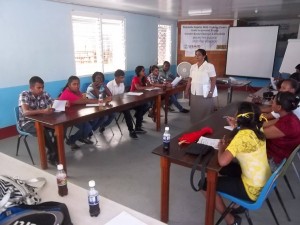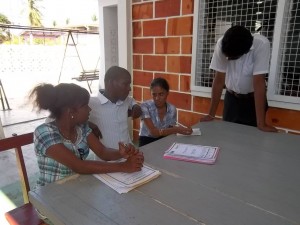
“Change begins with me. I cannot change the world but if each one can reach one, our society will be a caring and peaceful one.” This is the sentiment that guides the lives of a group of energetic young people at the Roadside Baptist Church Skills Training Centre.”
With a goal to improve the quality of life of people of all ethnic groups and religious backgrounds in their community, the youth arm of the centre assiduously work to accomplish this.
One of the approaches Roadside Baptist has found to be effective in fighting against gender-based violence and HIV/AIDS is through peer education by adults and youths. They meet in small groups to have a more personal interaction with persons affected by gender-based violence and HIV/AIDS.
In collaboration with USAID/CSDS and the Governance Enhancement Projects, Roadside Baptist selected youths from secondary schools, religious and sports groups across Region Six, and from within the community, to be trained as peer educators in HIV/AIDS and gender-based violence prevention.
Talented Steve Verasa, one of the avid peer educators, shares information through songs in order to reach youths.
Speaking with Guyana Times Sunday Magazine, Steve said he was motivated to pen his composition “Struggles of a Woman” because he wanted people to become more aware of abuse and at the same time showcase his talent.
“I had always wanted to be an advocate on social issues. I also wanted to be a part of the fight against violence of all forms. For the past months, I was involved in workshops and training programmes on the prevention of gender-based and other forms of violence, and I’m happy that I managed to grasp some additional knowledge. With the knowledge gained, I plan to pass it on to others through my music,” he revealed.

Steve is one of many youths who are passionate about their humanitarian work in saving lives and encouraging youths like themselves to be role models in society.
Roadside found that the age range of 13 to 24 is a crucial period because this is when young people are experimenting and trying to live up to expectations of others, especially their peers.
Peer education, it believes, is also vital because it focuses on saving future generations from the scourge that continues to disintegrate the family unit. Additionally, the peer education component of the organisation encourages abstinence, faithfulness, and HIV testing. It promotes positive living through awareness and “godly fear”.
Knowing that people, youths in particular, usually relate to their own age groups, the centre’s peer educators strategically use this technique to help peers develop skills to transition from negative to positive behaviour.
Discussions focus on healthy relationships, developing self-esteem, avoiding substance abuse and managing anger. These take place in a formal and informal environment. Formal environments are used based upon invitations by a member of a small group/organisation. Peer educators, mostly youths, present information through the performing arts, videos, leaflets and brochures. An integral part of their voluntary work is counselling, support, referrals and other services.
Recently, a few of them were of great encouragement to a youth who was hospitalized and had practically given up on life. Their presence at his bedside at the hospital comforted the ailing youth. Follow-up visits and counseling also helped him to continue with his studies and to better face his challenges.
Another instance where the peer educators were able to help was with a teenager who was suicidal due to many challenges she faced. With the intervention of the peer educators, she has renewed strength and is now equipped to face these challenges.
Peer education, for this group of young people, has been a rewarding opportunity to develop leadership skills, gain the respect and confidence of their peers, and improve their own knowledge and skills. The recognition that they gained as role models in society is the catalyst that helps them to strive daily to live responsibly and to reach out to their peers.
For more information about this group visit Peer Educators, Counsellors on Facebook or www.peereducounselor.webs.com



